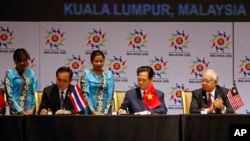Leaders of the 10-member Association of Southeast Asian Nations (ASEAN) Sunday signed a declaration establishing a formal economic, political, security and socio-cultural community.
“Our ASEAN way has guided us and will continue to be our compass as we seek to realize a politically cohesive, economically integrated, socially responsible and a truly people-oriented, people-centered rules-based ASEAN,” said summit host, Malaysian Prime Minister Najib Razak, at the signing ceremony, which was witnessed by U.N. Secretary-General Ban Ki-moon.
Najib hailed the establishment of the ASEAN Community “as a landmark achievement” more than a dozen years after the concept was first proposed.
Many tariff barriers have already been eliminated among ASEAN states although many politically sensitive sectors remain protected, such as agriculture, auto production and steel.
"Now we have to assure freer movements and removal of barriers that hinder growth and investment," Najib added.
Signing just a start
But analysts say much work remains for the most important pillar - the ASEAN Economic Community (AEC) - to achieve its primary goal of allowing freer movement of skilled workers, trade and capital for the region’s more than 600 million people – more populous than North America or the European Union.
Integrating ASEAN economies, intended to help the region compete with giants China and India, would create the world’s seventh-largest single market.
Compared to the European Union, the AEC is culturally and politically more diverse with various systems of government including communism (Laos and Vietnam), a military junta (Thailand), authoritarian (Cambodia), quasi-civilian (Myanmar) and a monarchy (Brunei).
Corruption
In a number of the ASEAN states corruption is considered endemic, a problem seen as hampering the economic integration process.
“I did raise with Prime Minister Najib – as I have with many of the leaders here in Southeast Asia, but and also many of the leaders in Africa, in Latin American and everywhere we go - the importance of transparency, accountability, the importance of rooting out corruption - all of which are impediments to development, all of which hold countries back,” President Barack Obama told reporters in Kuala Lumpur Sunday.
A new ASEAN-U.S. Strategic Partnership announced during the summits in Malaysia outlines five priority areas of engagement including expanding economic cooperation.
Time will tell
The AEC is set to become fully functional December 31.
"Time will tell if today's signing ceremony is just more style over substance,” Curtis Chin, a former U.S. ambassador to the Asian Development Bank told VOA. “But come January 1, the ASEAN Community will be much less than today’s soaring rhetoric but certainly much more than ever envisioned decades past.”
Some in the region predict implementation of the AEC will excessively benefit corporate interests, not the majority of the region's population.
“As ASEAN moves towards regional economic integration, unequal and unsustainable economic growth will result in worsening poverty, inequalities of wealth, resources, power and opportunities between countries, between the rich and the poor and between men and women,” warned the ASEAN Civil Society Conference and ASEAN Peoples' Forum in a joint statement.




